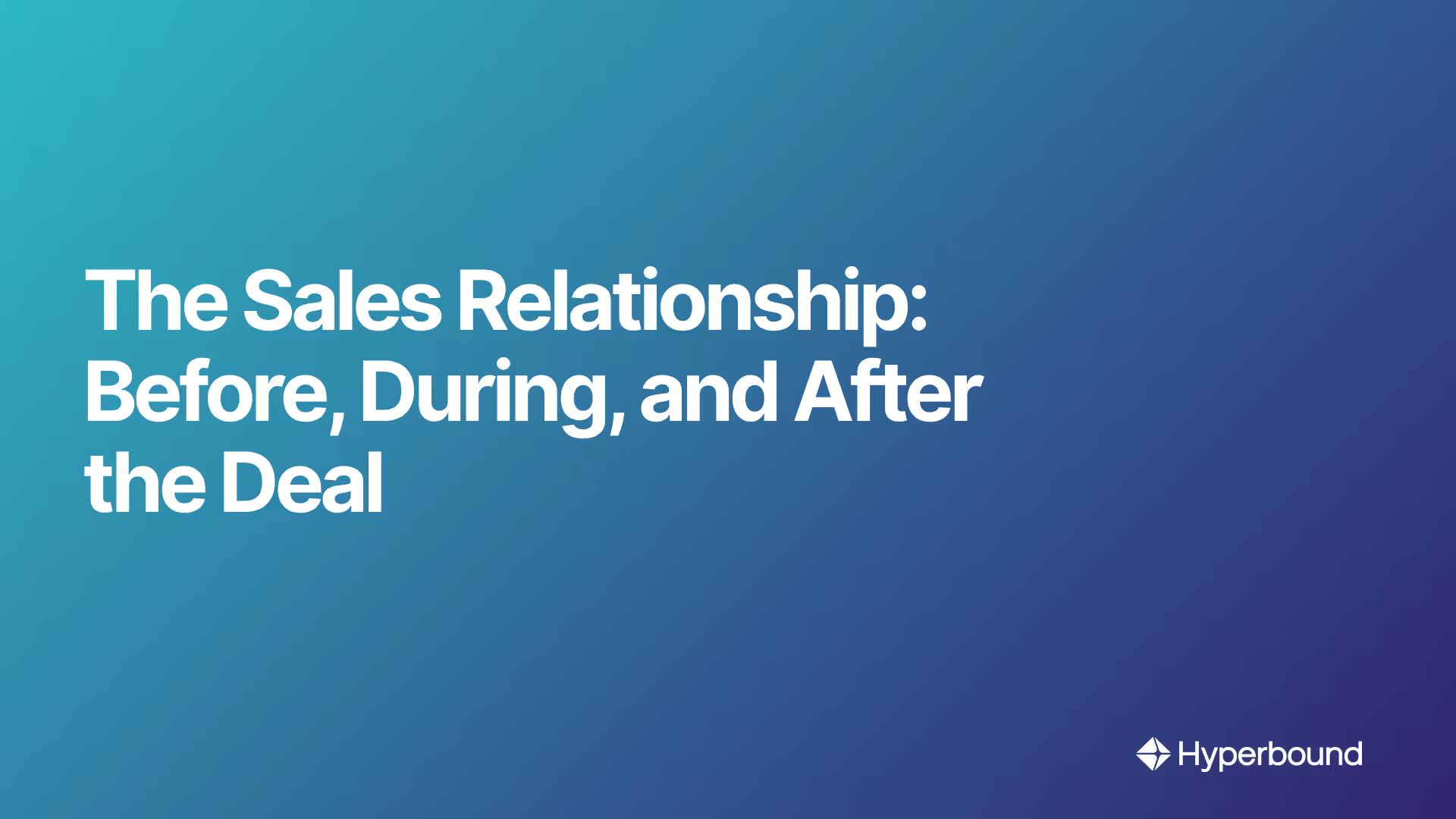
You've probably heard it countless times: "Sales is all about relationships." Yet when you dig deeper, this statement often causes confusion and even skepticism. One sales professional on Reddit summed it up perfectly: "I'm pretty sure your prospect doesn't want a relationship with someone who's trying to sell them."
This skepticism isn't unfounded. The concept of "relationship building" in sales has become muddled, with many salespeople believing it simply means getting prospects to like them personally. This fundamental misunderstanding leads to ineffective sales approaches and missed opportunities.
The truth? A meaningful sales relationship isn't about friendship—it's about trust. And it's not something that only matters after the customer signs; it's the foundation that drives the entire sales cycle from first contact to long-term partnership.

The Misconception: Relationships Only Matter Post-Sale
Many salespeople operate under the false assumption that "The relationship comes once they become a customer, not before." This transactional mindset can be particularly prevalent in SMB or entry-level sales roles, where the focus is often on volume and quick wins rather than sustainable connections.
But this approach leaves tremendous value on the table. According to Salesforce research, 87% of business buyers expect sales professionals to act as trusted advisors, not just product pushers. This expectation exists from the very first interaction, not just after the contract is signed.
Let's explore how to build and nurture meaningful sales relationships at each stage of the buying journey.
Before the Deal: Laying the Foundation of Trust
The prospecting and qualification phase isn't just about finding warm leads—it's your first and most critical opportunity to establish credibility and begin building trust.
Move From Pitching to Consulting
One of the biggest mistakes salespeople make is leading with their product rather than with insightful questions. As one sales professional bluntly put it: "You earn trust by asking tough questions and challenging the prospect on their bs."
A consultative sales approach focuses on understanding before prescribing. This means:
- Asking open-ended questions that uncover genuine business challenges
- Listening more than you speak
- Being willing to challenge assumptions when appropriate
- Providing value even before a purchase is considered
Prioritize Personalization Based on Research
According to Statista, 73% of consumers expect in-depth personalization in sales interactions. Generic pitches and obvious templates signal to prospects that you haven't invested time to understand their specific situation.
Effective personalization requires:
- Researching their company's recent news and developments
- Understanding their industry's specific challenges and trends
- Learning about their role and likely priorities
- Connecting their situation to relevant experiences you've had with similar clients
Build Multidimensional Trust
Prospects need to develop trust in three dimensions:
- Trust in you as a person: That you're sincere, knowledgeable, and reliable
- Trust in your product: That it will deliver on its promises
- Trust in your company: That the organization is stable and reputable
In the early stages, focus particularly on establishing personal trust by demonstrating expertise and reliability. Follow through on every promise, no matter how small. Be punctual for meetings. Respond promptly to communications. These seemingly minor actions build the foundation for greater trust later.
During the Deal: Deepening the Partnership Through Action
The negotiation and closing phase is where you validate the trust you've begun to build. Every interaction during this critical period must reinforce your credibility and demonstrate your commitment to the prospect's success.
Maintain Unwavering Consistency
As the deal progresses, maintain consistent messaging and follow through on every commitment. Inconsistency is one of the fastest ways to erode trust. This means:
- Ensuring your messaging stays aligned from first call to final proposal
- Following up precisely when promised
- Keeping all stakeholders appropriately informed
- Avoiding sudden changes in terms or expectations
Demonstrate Problem-Solving in Real Time
Move beyond talking about solutions to actively showing how you can address their specific challenges:
- Provide tailored demos that directly address the pain points uncovered during discovery
- Offer customized presentations that speak to their unique situation rather than generic capabilities
- When possible, create proof-of-concepts that demonstrate your solution's value in their context
- Share relevant case studies of similar companies you've helped
Handle Objections Collaboratively
In B2B sales especially, objections aren't roadblocks—they're opportunities to deepen the relationship through collaborative problem-solving. When faced with concerns:
- Validate the objection rather than dismissing it
- Ask clarifying questions to understand the underlying concern
- Work together to find solutions, positioning yourself as a partner
- Be willing to involve other stakeholders or resources when needed
This collaborative approach demonstrates your commitment to value selling rather than simply closing a transaction.
Practice Radical Transparency
Nothing builds trust faster than honesty, especially about limitations. According to sales professionals on Reddit, "The relationship is built on value and trust and that's enough." This means:
- Being forthright about what your solution can and cannot do
- Setting realistic timelines and expectations
- Addressing potential implementation challenges proactively
- Admitting when you don't know something and committing to finding the answer
This transparency might seem risky, but it dramatically strengthens the relationship by demonstrating your commitment to the prospect's best interests rather than just your commission.

After the Deal: Nurturing a Long-Term Partnership
The moment the contract is signed isn't the finish line—it's the starting point for the most valuable phase of the relationship. This is where you transform a customer into a loyal advocate who drives retention and referrals.
Prioritize Continuous Engagement
Many salespeople—especially in transactional roles—make the critical mistake of disappearing after the deal closes. As one sales professional noted, "When you're in SMB or a transactional role, you don't care about your customers beyond are they going to buy, buy a lot, and buy quickly."
This approach is shortsighted. Research shows that acquiring new clients costs significantly more than retaining existing ones, and according to a study published on SSRN, 80% of a firm's future profits will come from just 20% of its existing customers.
Effective post-sale engagement includes:
- Regular check-ins focused on value rather than upselling
- Sharing relevant industry articles and best practices
- Ensuring smooth onboarding and implementation
- Acting as their advocate within your organization when issues arise
Implement Strategic Account Management
For key accounts especially, implement structured relationship management processes:
- Assign dedicated account managers to maintain continuity
- Create tailored account plans with clear goals and milestones
- Schedule periodic business reviews to assess progress and identify new opportunities
- Develop multiple contacts throughout their organization to strengthen the relationship at all levels
Transform Customers Into Advocates
The ultimate goal of relationship management is to create passionate advocates for your solution. According to Bain & Company, long-term customers not only spend more but become powerful referral sources. To cultivate advocates:
- Create formal referral programs that reward customer advocacy
- Celebrate their milestones and successes
- Feature them in case studies and testimonials (with permission)
- Invite them to exclusive customer events or advisory boards
Prioritize Long-Term Value Over Short-Term Gains
Sometimes protecting the relationship means sacrificing immediate revenue opportunities. This might include:
- Recommending a less expensive option that better fits their needs
- Being honest when a new feature isn't right for their use case
- Proactively addressing issues before the customer discovers them
- Advocating for the customer within your organization
These actions demonstrate that you're committed to being their trusted advisor for the long term, not just meeting your quarterly quota.
From Transactional Selling to Trusted Partnership
The evolution from transactional selling to relationship-based sales represents a fundamental shift in approach:
This shift is not merely about being liked—it's about establishing yourself as a trusted advisor who delivers consistent value throughout the entire customer lifecycle.
The Career Impact of Relationship Skills
As one experienced sales professional bluntly stated on Reddit: "If you don't see the value of relationships, you'll be stuck in entry-level sales roles the rest of your career."
While transactional approaches might work for simple products or one-time purchases, the ability to build and nurture meaningful customer relationships is what separates average performers from top earners, particularly in complex B2B sales environments.
The soft skills required for effective relationship management—active listening, empathy, consultative problem-solving, and follow-through—aren't secondary nice-to-have abilities. They're the core competencies that transform salespeople into trusted advisors who can command premium prices and build sustainable careers.
By mastering the art of relationship building before, during, and after the sale, you position yourself not just as a vendor but as a valuable partner in your customers' success—creating a sustainable competitive advantage that no product feature or price discount can match.
Frequently Asked Questions
What is relationship building in sales really about?
Relationship building in sales is primarily about establishing trust and credibility, not about becoming friends with your prospects. It's about positioning yourself as a trusted advisor who understands the prospect's business challenges and consistently delivers value. This trust is built across three dimensions: trust in you as a professional, trust in your product's capabilities, and trust in your company's reputation.
Why is building trust before the sale important?
Building trust before the sale is crucial because it sets the foundation for the entire buying journey and is expected by the majority of buyers. According to research, 87% of business buyers want a trusted advisor from the very first interaction. Early trust-building activities, like consultative questioning and deep personalization, demonstrate your credibility and commitment to their success, making the rest of the sales process smoother and more effective.
How can I build trust as a salesperson?
You can build trust by consistently demonstrating reliability, expertise, and transparency throughout the sales process. Key actions include:
- Consultative Selling: Ask insightful questions to understand needs before pitching.
- Personalization: Research the prospect and tailor your communication.
- Consistency: Maintain a consistent message and always follow through on promises.
- Radical Transparency: Be honest about your product's capabilities and limitations.
What is the difference between transactional and relationship selling?
The primary difference lies in the focus: transactional selling prioritizes quick, one-time sales, while relationship selling focuses on long-term customer value and partnership. Transactional selling centers on product features and closing deals quickly. In contrast, relationship selling centers on understanding business outcomes, treating objections as opportunities for collaboration, and measuring success by customer lifetime value rather than just the initial deal size.
How does handling objections affect a sales relationship?
Handling objections collaboratively is a key opportunity to strengthen the sales relationship by demonstrating your commitment to solving the customer's problems. Instead of viewing objections as roadblocks, treat them as chances to deepen your understanding. By validating the prospect's concern, asking clarifying questions, and working together to find a solution, you transform a potential conflict into a trust-building moment, positioning yourself as a true partner.
What should I do after closing a deal to maintain the relationship?
After closing a deal, you should prioritize continuous engagement and strategic account management to transform the customer into a long-term partner and advocate. Avoid the common mistake of disappearing post-sale. Instead, schedule regular check-ins, share valuable industry insights, ensure a smooth onboarding process, and act as the customer's advocate within your company. This focus on post-sale value is critical for retention, referrals, and maximizing customer lifetime value.

Book a demo with Hyperbound
.png)













